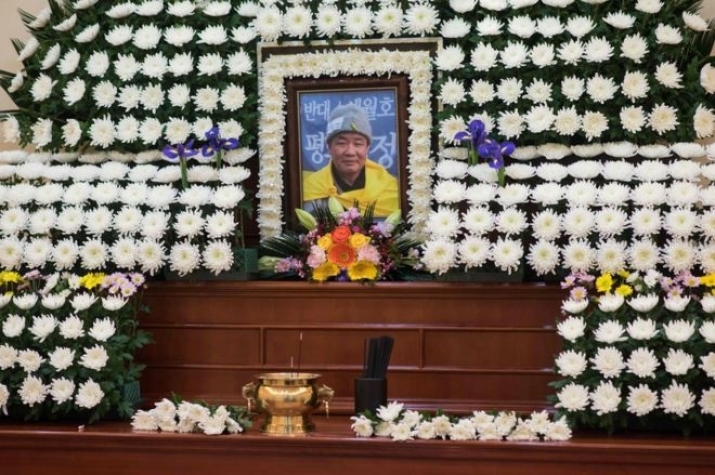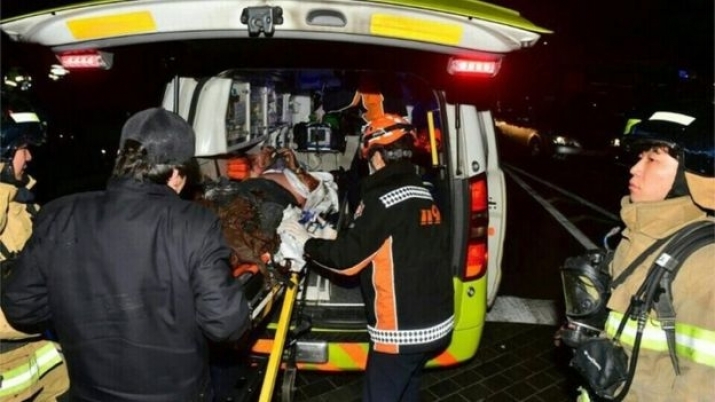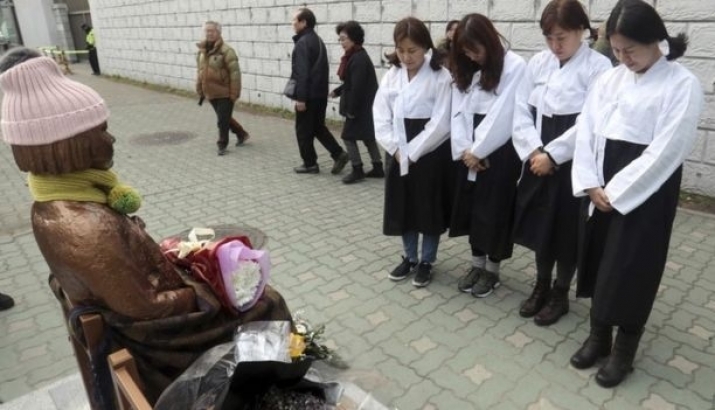NEWS
Korean Monk Dies of Injuries After Self-immolation Protest
 Ven. Jung-won, 64, was pronounced dead on Monday night of multiple organ failure. From bbc.com
Ven. Jung-won, 64, was pronounced dead on Monday night of multiple organ failure. From bbc.comA South Korean Buddhist monk who set himself on fire in central Seoul last week to protest the Korean government’s agreement with Japan over compensation for wartime “comfort women” died from his injuries late on Monday.
The monk, identified as Venerable Jung-won, set himself on fire last Saturday during a mass rally calling on impeached President Park Geun-hye to stand down over an ongoing political corruption scandal. Ven. Jung-won, 64, had suffered third-degree burns to 70 per cent of his body and serious damage to his internal organs. The monk was pronounced dead on Monday night of multiple organ failure, according to Seoul National University Hospital.
The monk reportedly left a message in a notebook at the scene of his self-immolation in which he described Park as a traitor for the government’s 2015 agreement with Japan aimed at resolving a long-standing dispute over South Korean women who were forced into sexual slavery by the Japanese military during World War Two. The monk reportedly called for the Korean prime minister to be arrested and the agreement with Japan nullified. “Please don’t make my death worthless,” his message read. (The Korea Times)
In the 2015 deal, Japan agreed to fund a Seoul-based foundation to support South Korean women who were forced to work in Japanese military brothels. In exchange, South Korea pledged to cease criticizing Japan over the issue and to address Japan’s complaint over a bronze statue representing wartime sex slaves, often referred to as comfort women, which had been placed in front of its embassy in Seoul. Under the terms of the deal, the two countries pledged that the compensation and an apology from Japan’s prime minister would “finally and irreversibly” resolve the matter.
 Ven. Jung-won is carried into an ambulance in Seoul on 7 January. From bbc.com
Ven. Jung-won is carried into an ambulance in Seoul on 7 January. From bbc.comVen. Jung-won “sacrificed his life to convey people’s sentiment, including . . . the demand for President Park Geun-Hye to resign,” the social justice committee of the Jogye Order of Korean Buddhism said in a statement. “We hope that no lives will be lost like this and the whole country will be stabilized soon.” (BBC)
The Jogye Order is a school of Seon (Zen) Buddhism and South Korea’s largest Buddhist tradition, which traces its roots back 1,200 years to the Unified Silla (also known as the Later Silla) kingdom (668–935). The Jogye school as a distinct entity emerged in the late 11th century when the monk Bojo Jinul, credited as the school’s founder, sought to combine Seon practices with the theological underpinnings of sutra-based Buddhist schools, including Korean Pure Land Buddhism.
Relations between South Korean and Japan grew tense last Friday after Japan withdrew its ambassador in Seoul and suspended economic talks in response to a dispute over another statue representing wartimes sex slaves that was placed outside its consulate in Korea’s second-largest city, Busan. Japan called the 1.5-meter bronze sculpture depicting a young, barefoot woman sitting in a chair a violation of the 2015 agreement.
In a televised talk show on Sunday, Japanese Prime Minister Shinzo Abe called on the South Korean government to remove the statues and adhere to the 2015 deal. “It has been mutually confirmed that this is a final and irreversible agreement. Japan has sincerely fulfilled its obligation,” said Abe, observing that Japan had already paid ¥1 billion (US$8.5 million) in compensation. (Al Jazeera)
 The statue of a girl has become a symbol in South Korea for the issue of wartime sex slaves. From bbc.com
The statue of a girl has become a symbol in South Korea for the issue of wartime sex slaves. From bbc.comMany Koreans still harbor bitter resentment over the legacy of Japan’s 1910–45 colonial occupation of the Korean Peninsula, and remain critical of the government’s attempt to bring closure to the issue of comfort women because it was announced without the approval of surviving victims. The statue in Busan is the 55th such memorial placed by activists at various locations across the country. According to a Seoul based group that represents the women, there are at least 40 surviving former sex slaves in South Korea.
See more
S Korean monk dies after sex slave self-immolation protest (BBC)
S. Korean dies after setting himself ablaze over Japan deal (Associated Press)
S. Korean monk in critical condition after setting self on fire (Yonhap News Agency)
South Korean Buddhist monk in critical condition after setting himself on fire over ‘comfort women’ deal (The Japan Times)
Buddhist monk in critical condition after setting himself on fire in anti-president rally (The Korea Times)
S Korean monk critical after sex slavery deal protest (Al Jazeera)
Related news from Buddhistdoor Global
Korean Nun Publishes New Book on Buddhist Cuisine to Heal Mind and Body
Korean Buddhist Cuisine Helps France and Korea Celebrate 130 Years of Diplomatic Ties
Asian Buddhist Animal Rights Conference Held in Seoul, South Korea
Korean Monk Hopes to Spread Buddhist Teachings in Cuba
Related features from Buddhistdoor Global
From Seoul to Somerville: The Founding of a Korean Won Buddhist Temple in Massachusetts
Seon and the City














